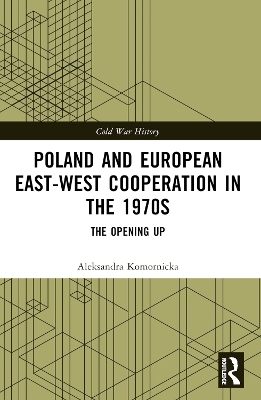
Poland and European East-West Cooperation in the 1970s
Routledge (Verlag)
978-1-032-39217-2 (ISBN)
- Lieferbar (Termin unbekannt)
- Versandkostenfrei innerhalb Deutschlands
- Auch auf Rechnung
- Verfügbarkeit in der Filiale vor Ort prüfen
- Artikel merken
It bridges Poland’s socialist domestic history with critical developments of the global and European 1970s, including détente in the Cold War, western European integration, and globalisation. In this period of international transformations, socialist Poland under Edward Gierek's leadership multiplied its economic and political contacts with capitalist countries, especially western Europe, and became a leader of East-West cooperation among Council for Mutual Economic Assistance and Warsaw Pact members. Relying on sources from public and corporate archives in five different European states, the book demonstrates both that the global political and economic transformations of that period were critical for the decision-making process in Poland and, moreover, that the national socialist elites participated in shaping these transformations. By looking at the goals and expectations of the Polish socialist elites and their practices of political and economic exchanges with western Europe, the book explains the logic which drove the socialist regime into entanglement with the West. As is shown here, this entanglement proved inextricable and critical for the socialist regime's failure and Poland’s political and economic future.
This book will be of much interest to students of European history, cold war studies, socialism studies and International Relations.
Aleksandra Komornicka is an assistant professor at Maastricht University and has a PhD from the European University Institute. Her research focuses on the international and economic history of post-war Europe in particular on the Cold War, European integration and Poland.
Introduction Part I: The rise and fall of the national strategy of the 1970s 1. Towards the big opening, the late 1960s 2. Bold and ambitious: a new national strategy, 1971-2 3. Perfect timing? 1973-5 4. Defending the status quo, 1976-80 Part II: Licence agreements with Western European companies 5. Prosperity, progress, profit, and peace: the goals and expectations of the licence policy 6. The deal of the decade: Italy, Fiat, and the production of passenger cars 7. Cementing political rapprochement: France, Berliet, and new city buses 8. Facing electronic giants: the FRG and audio equipment 9. Gains and losses of the licence policy Epilogue and conclusion
| Erscheinungsdatum | 04.10.2023 |
|---|---|
| Reihe/Serie | Cold War History |
| Zusatzinfo | 2 Tables, black and white; 1 Line drawings, black and white; 1 Illustrations, black and white |
| Verlagsort | London |
| Sprache | englisch |
| Maße | 156 x 234 mm |
| Gewicht | 453 g |
| Themenwelt | Geisteswissenschaften ► Geschichte ► Regional- / Ländergeschichte |
| Geschichte ► Teilgebiete der Geschichte ► Militärgeschichte | |
| Sozialwissenschaften ► Politik / Verwaltung ► Europäische / Internationale Politik | |
| Sozialwissenschaften ► Politik / Verwaltung ► Staat / Verwaltung | |
| ISBN-10 | 1-032-39217-7 / 1032392177 |
| ISBN-13 | 978-1-032-39217-2 / 9781032392172 |
| Zustand | Neuware |
| Haben Sie eine Frage zum Produkt? |
aus dem Bereich


